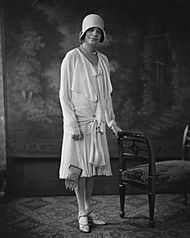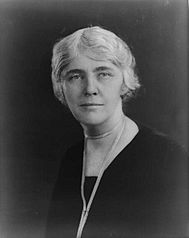Jessie De Priest tea at the White House facts for kids
In 1929, Lou Hoover, the First Lady of the United States, invited Jessie De Priest to a special tea at the White House. Jessie De Priest was the wife of Oscar De Priest, a congressman from Chicago. He was important because he was the first African American elected to Congress in the 1900s. He was also the first Black congressman elected from outside the Southern states.
Many politicians and journalists from the Southern states were very angry about this invitation. They strongly protested it. At this time, many Southern states had taken away the right to vote from most African Americans. They also had strict Jim Crow laws that forced racial segregation in public places. This meant Black people and white people were kept separate.
Even though Herbert Hoover had won five Southern states in his 1928 election, some of these states were now criticizing the tea invitation. A congressman named George H. Tinkham had recently tried to pass a law. This law would have made states follow the 14th and 15th Amendments. These amendments protect against racial discrimination. His idea was defeated. However, some politicians used the White House tea as a way to rally against President Hoover.
Contents
A Look Back: Black Leaders at the White House
Before 1929, several U.S. Presidents had welcomed Black leaders to the White House. For example, Presidents Lincoln, Grant, Hayes, Cleveland, and Coolidge had met with important Black figures. These included Frederick Douglass and Sojourner Truth.
In 1798, President John Adams even had dinner with Joseph Bunel. Bunel was a representative from Haiti, and his wife was Black. After the Civil War, some Black Republicans were elected to Congress from the South. In 1901, President Theodore Roosevelt invited Booker T. Washington to dinner. Washington was a national leader and head of Tuskegee Institute, a college for Black students.
Changes in the South
From 1890 to 1908, Southern states passed new laws. These laws took away the right to vote from most Black people. This meant Black citizens were excluded from politics. However, these states still had many representatives in Congress. This gave white politicians from the South a lot of power.
These states also enforced white supremacy and Jim Crow laws. These laws made Black people second-class citizens. They forced racial segregation in public places. So, when the Hoovers invited Jessie De Priest to the White House, it challenged the social rules of the South.
Why the Invitation Was Important
Oscar Stanton De Priest was the first Black person elected to Congress in the 20th century. He was also the first ever from outside the Southern states. Washington's high society had often ignored the De Priest couple. But the White House had a tradition. The First Lady always hosted teas for congressional wives.
Lou Hoover and President Hoover never thought about not inviting Jessie De Priest. Accounts differ on which tea she attended. But Mrs. Hoover made sure that the other guests were welcoming to Mrs. De Priest.
President Herbert Hoover had won five Southern states in his election. These states voted for him instead of the Democratic candidate, Alfred E. Smith. Smith was a Roman Catholic and Governor of New York. Both Republicans and Democrats were trying to understand these voting patterns. Hoover wanted to build more Republican support in the South among white voters. Democrats wanted to unite their supporters against him.
In 1929, Republican Congressman George H. Tinkham spoke in Congress. He argued for enforcing the 14th and 15th Amendments. He wanted to punish Southern states for racial discrimination. He suggested reducing the number of representatives these states had in Congress. This would be based on how many people they had prevented from voting. Tinkham's ideas were defeated. But they made the South feel more threatened by Hoover's government.
What Happened Next
The White House never officially commented on the news reports. Mrs. Hoover held her teas, and Jessie De Priest attended. Congressman De Priest spoke out strongly against the insults from the South.
Some Republican congressmen, like Albert H. Vestal and George M. Pritchard, snubbed De Priest. In response, De Priest did not invite them or their wives to a reception. This reception was a fundraiser for the NAACP, a civil rights organization.
Southern Democratic politicians kept control of important committees in the U.S. House after 1930. They successfully stopped efforts to change how representatives were divided. Racial segregation continued in the South for many years. It was not until the national civil rights laws were passed in 1964 and 1965 that things began to change.
 | William L. Dawson |
 | W. E. B. Du Bois |
 | Harry Belafonte |



